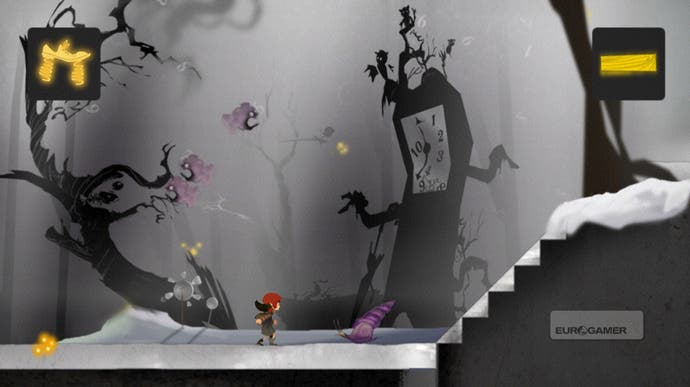Lucidity
A clear winner.
As the adventure progresses, you constantly discover interesting new combinations for old objects - you can use a fan to cast Sofi up into the range of a catapult, say, or spring her into the distance and catch her with a simple ledge. Eventually, as your delicate charge plods onwards through forests, farmlands and fields of ice while you keep an eye on the road ahead, you genuinely might start to feel a bit like her guardian.
Randomising the objects mean you won't be able to slowly reduce each level to its ultimate racing line, however: this is an open-ended puzzle game, more Columns than Braid. It's built for tinkerers rather than perfectionists, with frenzied improvisation taking precedence over feats of memory and timing.
Most of the levels are surprisingly roomy, meaning you can explore the vertical space further than you might initially think if you've got the steps to get you up and down and enough bombs to break through barriers. To tempt you into heading back in again once the game's three acts are over, each area is scattered with clusters of fireflies to collect - either because you want to unlock extra challenges, or just because they're fireflies and it's that kind of game.
Sofi's entire adventure takes place against an arts-and-crafts backdrop that mixes nursery imagery with rustic menace. It's a papery fantasy world of diffused ink and misty chalk, where the shadows are pitch black and filled with staring eyes. Lucidity looks like a children's book, then, but possibly one of those weird Scandinavian ones that seem designed to scare and unnerve young minds: a Tove Jansson rather than a Rev. W. Awdry. For all its sprightly fir trees and twinkling Christmas card stars, Lucidity isn't particularly interested in comforting you. And why should it? Nana's dead, after all, and she won't be coming back.
But she has left some postcards - lovely sepia fragments waiting for Sofi at the end of each level, with messages on the back to suggest that, prior to shuffling off into the ether, the old dear could have made a decent wedge writing copy for Hallmark. They lend the game a neat structure - and the little post boxes they lurk inside are possibly the game's most inspired visual signature - but they also highlight a crucial weakness.
Lucidity, with its dreamy double-word-score title and tinkly, wafting soundtrack, can be a little self-conscious with its downbeat charms, a little calculated in its regular lunges at your heart. Years spent under the yoke of Luke Skywalker means Lucasarts may have lost a little confidence in its own storytelling abilities.

Elsewhere, on a more structural level, the company that never harmed a single hair on your head when you were poking around in the gruesome corners of Melee Island now kills you dead at every opportunity - dropping Sofi off cliffs or sending in swarms of toothy fish to bite her in half. Restarting after a nasty fall is hardly a crime in a platformer the same way it is in an adventure game, but the lack of any mid-level checkpoints can make some of Lucidity's more elaborate stages a bit of a trudge.
The blend of emotions and puzzle mechanics in Lucidity invites more than a few comparisons with Braid. But while the melancholic tone and understated delivery suggests a good match, in truth, Lucasart's game is neither as complex or as original.
Not that it matters, really. So much here comes down to the simplest of tests: the gap between an annoying death and your own willingness to get on with the life beyond, the length of time separating a fail from a restart. With Lucidity you may find that, no matter how many times you drop off the screen, you're ready to wade back in again and again with little obvious bitterness.
It's a sign, in other words, that while Sofi may be lost and confused, her creators know exactly where they are, and exactly what they're doing.








